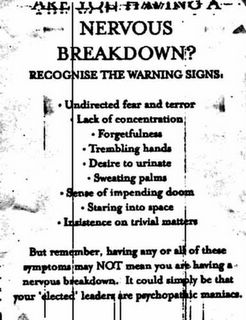I'm posting because I'm trying to avoid studying for the GRE Subject Test. This whole process of applying to graduate school is long, drawn-out, oppressive. But every day that I go to work I realize more and more that I should not be doing this yet; that I do not want to be a "Legal Assistant" (what the hell is that anyway? Why do crummy jobs always have the vaguest names?); that the only thing I have known in life is school and that is where I feel most comfortable. But how do I turn that into a "Statement of Purpose"? How do I write a "Personal Statement" about how I am running back to a womb (maybe not a fetal womb, per se, but certainly a more youthful day--a child-like state, at least)? I am not an academic man, though I try to be. I do not read as much as I should. I do not remember half the things I learned in college, and I barely remember one-eighth of the things I learned in high school. And other than trying to escape from the nine-to-five, I do not know why I want to go to graduate school. I have nothing to prove. I have no real academic goals other than getting a Doctorate in Philosophy and possibly teaching (though praying for a good publishing contract). All I know is that my friends say I have changed, I feel I have changed, and I am not happy where I am. Is that something some stiff in an admissions office in some accredited institution wants to see? I doubt it.
So what do I do? Find a new job? That certainly is an option, but there is the gamble that I will run into a worse job than the one I am currently doing (it is hard to believe, but I am sure there are worse). I also promised my mother I would further my education. And honestly, I do want to go graduate school, it is just applying for it that is so burdensome. It is also hard to leave a small office when you have worked there for a while. Things could fall apart; you are not so easily replaceable. I am Mr. Guilt. I somehow think I would feel less guilty if I had to leave work because of graduate school than to leave work for another job. Maybe they would understand better, I do not know.
Really, I know in my heart of hearts (as the sole-practitioner lawyer who shares office space with us says) that I should just buckle down, suck it up, and, as a co-worker says, "get 'er dun'!" (Another reason to leave...) But it is far easier to come home from work and do nothing than to study, or contact professors for letters of recommendation, or rifle (me) through old boxes looking for the last ten page paper I wrote to be submitted as a writing sample, or trying to get my official transcript, or sending GRE scores to schools that have not received them yet. I'm not lying, I'm lazy.
It's as Bart Simpson says, "You're damned if you do, and you're damned if you don't."
